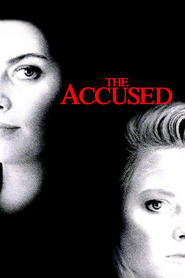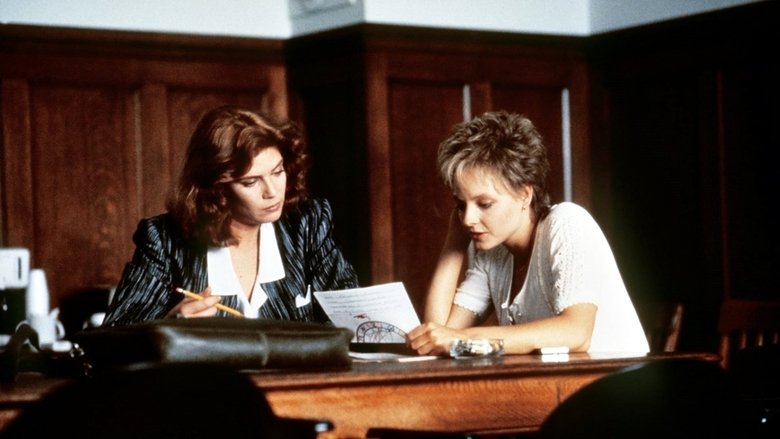“The Accused” is a 1988 film that follows the story of a young woman named Sarah Tobias who is gang-raped at a bar. She fights for justice against the men who assaulted her, with the help of a lawyer named Kathryn Murphy. The movie is a tense and emotional roller coaster, showing how difficult it can be to stand up against powerful men and establish the truth in a world that often judges victims unfairly. Jodie Foster’s powerful performance as Sarah earned her an Academy Award for Best Actress and helped raise awareness about sexual assault. Overall, “The Accused” is an important film that still resonates today, reminding us of the importance of speaking out against injustice and standing up for survivors.

↓↓↓
Review
The Accused: A Film about Justice
Outrage. Horror. Disbelief. These are the emotions that “The Accused” evokes. Released in 1988, this film directed by Jonathan Kaplan tells the story of Sarah Tobias, a young woman who is brutally gang-raped while bystanders cheer her attackers on.
The film is loosely based on the real-life gang rape of Cheryl Araujo in 1983, which took place in a Massachusetts bar and resulted in only one conviction. The case sparked national attention and debate about rape culture and victim-blaming.
Jodie Foster delivers a powerful performance as Sarah, a tough-talking waitress with a troubled past who must confront not only her attackers but also the justice system that fails her at every turn. Her co-stars include Kelly McGillis as her lawyer, Kathryn Murphy, and Bernie Coulson and Leo Rossi as two of the rapists.
One of the most memorable scenes in “The Accused” takes place during Sarah’s testimony in court. Her lawyer insists that she describe what happened to her in excruciating detail to make the jurors understand the severity of the crime and her trauma. The scene is gut-wrenching as Foster’s character relives every moment of her harrowing experience.
The film received mixed reviews upon its release but has since become a cultural touchstone for discussions about rape culture and sexual assault. It was nominated for multiple awards, including an Academy Award for Jodie Foster’s performance.
Despite its age, “The Accused” remains relevant today as women across the world continue to fight against sexual violence and systemic oppression. As writer Dan Ariely has described it, “The Accused” is more than just a movie—it’s a call to action.
Watching “The Accused” can be a difficult experience, but it’s necessary if we want to build a world where survivors are heard and justice is served. The courage and strength of Sarah Tobias, both in the film and in real life, inspire us to keep fighting for a better future.
The story of “The Accused” is one that is unfortunately still relevant today. In recent years, we’ve seen high-profile cases like that of Brock Turner, who was sentenced to just six months in jail for sexually assaulting an unconscious woman on a college campus.
These cases illustrate the pervasive problem of victim-blaming and the reluctance of the justice system to hold perpetrators accountable. “The Accused” shows us that this has been going on for decades and that it’s up to us to demand change.
One thing that sets “The Accused” apart is its willingness to show the complexities of sexual assault cases. It’s not just about physical evidence or eyewitness testimony—it’s about understanding the psychological trauma that survivors experience and the ways in which they are often silenced or disbelieved.
We see this play out throughout the film as Sarah struggles to come forward and then faces backlash from her community as well as her attackers. Her lawyer must fight against a legal system that is more interested in protecting men than in seeking justice.
Kelly McGillis delivers a powerful performance as Kathryn Murphy, the lawyer who takes on Sarah’s case. Her determination to seek justice for her client is inspiring, even as she faces skepticism from those around her.
The scenes between Foster and McGillis are some of the most memorable in “The Accused.” They show two women working together against a system that would rather ignore their voices.
Of course, no discussion of “The Accused” would be complete without mentioning Jodie Foster’s transformative performance as Sarah Tobias. Foster had already established herself as a talented actress by 1988 (she had won her first Academy Award at age 26), but her work in this film marked a new level of intensity and emotional depth.
Foster reportedly took on the role because she was drawn to the challenge of playing such a complex character. Sarah is not always likable or sympathetic, but she is undeniably human. Foster brings out her vulnerability and strength in equal measure.
One of the most striking things about “The Accused” is its avoidance of the male gaze. While rape scenes in other films often focus on the attackers and their pleasure, “The Accused” keeps its attention firmly on Sarah and her experience.
This choice underscores the film’s message that rape is not about sex—it’s about power. The men who rape Sarah are not depicted as sexual beings but as violent criminals who seek to dominate and humiliate her.
“The Accused” may be difficult to watch at times, but it’s an essential film for anyone interested in understanding the realities of sexual assault. It gives voice to survivors and challenges us to confront our own biases and attitudes towards victims of violence.
As Kathryn Murphy says in one scene, “Rape is an act of violence—not sex.” “The Accused” reminds us that this truth is still too often ignored today. We need more films like this one to shine a light on these issues and keep pushing for change.
In conclusion, we can say that “The Accused” is a powerful and unforgettable film that tackles some of the most difficult issues facing our society today. From its searing performances to its unflinching depiction of sexual violence, it demands our attention and our action.
As Dan Ariely has written, movies like “The Accused” have the power to inspire us to become better people—to demand justice for those who have been wronged and to work towards a world free from violence and oppression. Let us take heed of this call and keep fighting for a brighter tomorrow.
Technical Data

- Runtime : 111
- Release : 1988-10-14
- Genre : Drama
- Cast : Kelly McGillis as A.D.A. Kathryn Murphy, Jodie Foster as Sarah Tobias, Bernie Coulson as Kenneth Joyce, Leo Rossi as Cliff “Scorpion” Albrect, Ann Hearn as Sally Fraser
- Crew : Gerald B. Greenberg as Editor, Brad Fiedel as Original Music Composer, Sally Dennison as Casting, Ralf D. Bode as Director of Photography, Gary Paller as Special Effects Supervisor
- Popularity 15.931
- Budget : 0
- Revenue : 0
- Company : Paramount Pictures Canada, Paramount
- Summary : After a young woman suffers a brutal rape in a bar one night, a prosecutor assists in bringing the perpetrators to justice, including the ones who encouraged and cheered on the attack.
- Tagline : Being a victim was her only crime.
